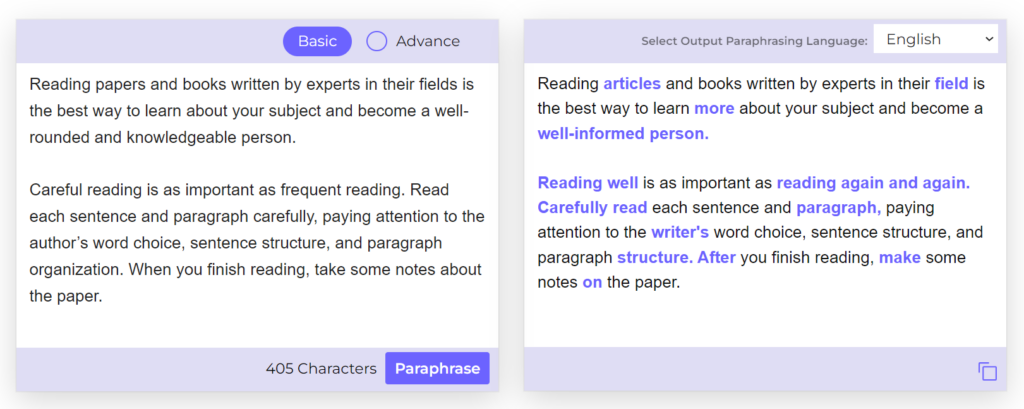When you’re writing a research paper, making an oral presentation, or writing an essay, you’ll likely be asked to paraphrase something.
Paraphrasing is similar to summarizing in that it involves taking the main point of an article and reducing it to a sentence or two without losing its essence. However, paraphrasing requires a little more effort than simply summarizing.
While summarizing requires cutting out unnecessary words and phrases, in paraphrasing you must also capture the author’s original meaning while repeating the exact same words.
Readers judge your ability to understand written material based on your ability to paraphrase it. So, if you find yourself struggling with this assignment, here are three ways to improve your skills:
Related Post: HOW TO PARAPHRASE A SENTENCE?
Tips for improving your Paraphrasing Skills
1. Read carefully and regularly
The more you read, the more you will become accustomed to the author’s writing style. If you read a lot, you will also have a lot of material to practice. Reading can also help you become more aware of the nuances of language — you can more easily recognize and understand an author’s approach, tone, and word choice.
More than that, reading is one of the most important things you can do as a student. Reading papers and books written by experts in their fields is the best way to learn about your subject and become a well-rounded and knowledgeable person.
Careful reading is as important as frequent reading. Read each sentence and paragraph carefully, paying attention to the author’s word choice, sentence structure, and paragraph organization. When you finish reading, take some notes about the paper.
This will help you remember what you read, which in turn will help you better understand the writer’s point of view and make your paraphrasing easier.
2. Use the Online Paraphrasing Tool
Using the Paraphrasing Tool is a great way to practice paraphrasing. Simply find an article or passage you want to paraphrase, copy it, and paste it into the online tool.

When you hit “Fix Plagiarism,” the online tool will show you your original text along. Choose the option that best matches your source text, and the online tool will let you know if your paraphrasing is exact, close, or loose. Paraphrasing tools not only help you improve your paraphrasing skills — they also help you identify your strengths and weaknesses.
For example, you may find that you can paraphrase exactly most of the time, but you need a little help getting there. With this in mind, you can adjust your paraphrasing techniques accordingly to improve your overall paraphrasing ability.
3. Practice by writing more and more in your own words
Now, this may sound strange, but writing your own essays and research papers is one of the best ways to improve your ability to paraphrase.
Not only will you be able to incorporate all the material assigned to you and get started on your next assignment, but you’ll also have the opportunity to practice reusing other people’s words in your own unique style.
If you struggle with paraphrasing, try this exercise: find a longer piece of reading and try to paraphrase it.
By giving yourself some time to do this, you’ll be able to fully focus on the task at hand and give your brain the time it needs to get the job done. After you finish, compare your paraphrase with the original and see where you can make improvements.
Summing up
Now that you’ve learned the ins and outs of paraphrasing, it’s time to put your new skills to the test. Remember that paraphrasing isn’t just summarizing — you have to keep the original meaning while saying the exact same words.
To do this, you need to read the original material carefully and consistently, use an online paraphrasing tool to help you practice, and write more and more in your own words. As you improve your skills, paraphrasing will become easier and easier.

